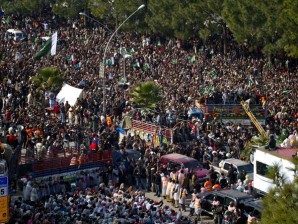Pakistanis protest killing of 15 in village raid

Supporters of Pakistani Sunni Muslim cleric Tahir-ul-Qadri participate in an anti-government rally in Islamabad, Pakistan, Wednesday, Jan. 16, 2013. Pakistan’s leaders received a powerful one-two punch Tuesday as the Supreme Court ordered the arrest of the prime minister in a corruption case and the firebrand cleric led thousands of protesters in another day of anti-government demonstrations in the capital. (AP Photo/Anjum Naveed)
PESHAWAR, Pakistan — Several thousand protesters shouting anti-military slogans displayed the bodies of 15 local villagers in northwestern Pakistan, claiming they were shot dead in their homes by security forces in an overnight raid. Hours later, police dispersed the protesters using water cannons and tear gas.
The outcry came as thousands of supporters of a fiery Muslim cleric continued their anti-government protest for a third day in Islamabad, paralyzing key areas of the capital. The interior minister warned that the government could take “targeted action” if the demonstrators did not leave the city by Thursday, but later backed off the threat after he was contradicted by the president.
Wednesday’s display of the 15 bodies, which were wrapped in blankets, recalled a protest last week in the southwestern city of Quetta. There, the relatives of dozens of Shiite Muslims killed in a bomb attack refused to bury the victims for four days until the government met their demand to dissolve the government of surrounding Baluchistan province. Islamic custom dictates the dead should be buried as soon possible.
The villagers in the latest incident were killed late Tuesday in an area known as Khyber Agency. It’s part of the tribal region where the Pakistani military has been waging a campaign against Islamic militants.
An official with the Frontier Constabulary, which operates in the area, blamed militants for killing the villagers. The official spoke on condition of anonymity because he was not authorized to speak to the media.
Article continues after this advertisementThere have been previous attacks by militants disguised in military uniforms, although such incidents are not common.
Article continues after this advertisementAbout 3,000 people gathered outside the house of the governor of northwest Khyber Pakhtunkhwa province in Peshawar. They said gunmen wearing military uniforms stormed homes and fatally shot the villagers.
The protesters called on the military to end its operations in the Bara area where the shooting occurred. One sign written in Urdu read: “We are also Pakistanis. Don’t kill us.”
Shabir Ahmed, a soldier from the Frontier Corps, said his four brothers and father were at their home when uniformed gunmen stormed his house.
“I want to know who killed my brothers and father and why,” he said.
Police used water cannons and tear gas to disperse the protesters around midnight after negotiations with officials broke down, said police officer Kamal Hussain. The dead bodies were loaded onto trucks after the protesters dispersed and handed over to Khyber political authorities to be returned to their families, said Hussain.
Human rights groups have accused the Pakistani military of widespread human rights abuses in their counter-insurgency campaign in the tribal areas.
In a December report, Amnesty International claimed the Pakistani military regularly holds people without charges and tortures or mistreats them in custody. The London-based group said some detainees do not survive and their bodies are returned to their families, or dumped in remote areas.
The Pakistani military rejected Amnesty’s allegations, calling the report “a pack of lies.”
The Amnesty report also criticized the Taliban for a range of rights abuses, including the killing of captured soldiers and innocent civilians.
In Islamabad, the cleric leading the protest in the capital addressed his supporters in a marathon four-hour speech. Tahir-ul-Qadri again called for the removal of the government and pilloried the country’s politicians as corrupt thieves. He said they were more interested in lining their pockets than dealing with pressing problems like severe energy and gas shortages.
“The country is like a goat for them that they are sharing and eating,” said Qadri, sitting in a bulletproof container as he faced thousands of protesters packed into the main avenue running through Islamabad.
The crowd was a bit smaller than the previous two days but attracted at least 20,000 people, according to an Islamabad police officer, who spoke on condition of anonymity because he was not authorized to speak to the media.
The 61-year-old cleric returned late last year after years in Canada and emerged as a significant figure in the political scene almost overnight. His rise has sparked allegations that he is working on behalf of the country’s powerful army to delay parliamentary elections expected in the spring in favor of a military-backed caretaker government. Qadri has denied the allegations.
The risk of political instability in Pakistan increased on Tuesday when the Supreme Court ordered the arrest of Prime Minister Raja Pervaiz Ashraf for alleged corruption while he was the minister of water and power. The premier has denied the accusations.
The timing of the court’s order and Qadri’s rally sparked accusations that the judges and the generals were both working to destabilize the government ahead of elections.
The cleric asked his supporters to pledge to continue demonstration until the government is dissolved and electoral reforms are implemented — measures he claims will make the system more democratic.
The government strongly opposes Qadri’s rally, and political leaders have called his demands unconstitutional.
Interior Minister Rehman Malik demanded in a press conference that Qadri and his supporters leave Islamabad by Thursday and warned the government could take “targeted action” if they didn’t, said the interior minister’s spokesman, Nawabish Ali Khan. Any action would be taken in a way to avoid harming women and children at the protest, possibly using water cannons, tear gas and rubber bullets, according to Khan.
Pakistani President Asif Ali Zardari later said there would be no operation against the protesters, according to the state-run news service. The interior minister then withdrew his threat, said Khan, his spokesman.